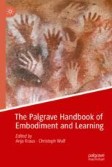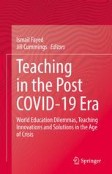Search
Search Results
-
Teacher Competence and Professional Development
Teacher competence is known to be one of the most influential factors that explain student learning. Since teaching is such a complex and...
-
Searching for the Lost Paradise
The dichotomous division between the Self and the Other corresponds to the division between humans and nature. Just as others marked as completely...
-
Problems Caused by Ignoring Descriptive Statistics in Language Testing
In 1980, I published a study on the relative merits of four cloze scoring methods [exact-answer (EX), acceptable-answer (AC), clozentropy (CLZNT),...
-
Negotiating Mnemotechnic Re-presentation
This chapter extends work of Bernard Stiegler on the capacity of the mnemotechnic tool to exteriorize, retain, and transmit re-presentations of...
-
Knowledge of Pathos
Tact, as a tactile intelligence that works closely with bodily and tacit knowledge, is the art of judgement that enables us to behave in a way that...
-
The Problem with Hard Histories
This chapter argues that teaching multiple “hard histories,” defined as complex, troubling periods in history, can lead to a lack of deep student...
-
Importance of Educology for Improving Education Systems
Educology is “knowledge of education.” Since knowledge is “recorded signs of knowing” and education is “intended and guided learning,” educology is...
-
Importance of Educology for Improving Education Systems
Educology is “knowledge of education.” Since knowledge is “recorded signs of knowing” and education is “intended and guided learning,” educology is...
-
Methodology
In this chapter, I argue that a dominant approach to studying social mobility relies upon survey data, which does not provide much evidence about the...
-
Implementing profession orientation as a design principle for overcoming Klein’s second discontinuity – preservice teacher’s perspectives on interface activities in the context of a geometry course
Intending to counteract Klein’s second discontinuity in teacher education, we explored and applied the innovation of “ interface ePortfolio ” in the...

-
Letting the Light Shine in: A Tapestry of Digital Literacies in Canadian Faculties of Education
The fabric of digital literacy learning and the measurement of digital competence in Canadian faculties of education is multi-colored and...
-
Can Pre-school Children Learn Programming and Coding Through Guided Play Activities? A Case Study in Computational Thinking
Guided play activities were developed so that coding clubs could promote computational thinking skills in preschool children. The clubs involved...

-
An Ethos of Wander Time: Staying with the Trouble to Make Sense During Crises
Amidst a steady clamor about “learning loss” during the pandemic, a minority of educators have cautioned we must, in the words of Donna Haraway,...
-
Theatre of War: Lola Arias’ Documentary Theatre as Innovative Tool for Historical Dialogue
The work of internationally renowned playwright Lola Arias explores the limits of historical representation working on the idea of “remaking”...
-
Storying in a Community College Classroom Using Reflection
By ignoring certain truths and focusing only on what I wanted to remember, I limited my pedagogical perspective. My goal to rehumanize the classroom...
-
The underconfidence-with-practice effect in action memory: The contribution of retrieval practice to metacognitive monitoring
When making memory predictions (judgments of learning; JOLs), people typically underestimate the recall gain across multiple study–test cycles,...

-
The influence of the conceptual structure of external representations when relearning history content
How does conceptual structure of external representations contribute to learning? This investigation considered the influence of generative concept...

-
Effective Storytelling to Engage Learners: Once Upon a Time
With an expanding and ever-adapting landscape in education, this chapter looks to the efficacy of storytelling as it applies to the mindset of...
-
Process of Racialisation, Creation of a Single Narrative and Restoration of Memory
This chapter challenges the ontology of a single definitive narrative on race through a systematic process of racialisation over centuries. It...
-
Introduction: “Official Perspective” and the Two Senses of Justice
This Introduction chronicles the development of the author’s research examining intersections between literacy and race in U.S.-Dakota War...
